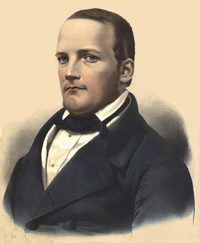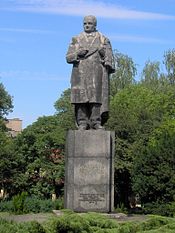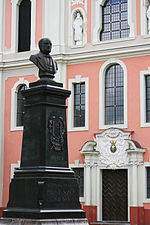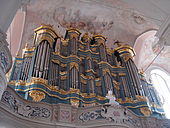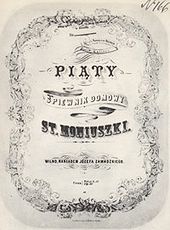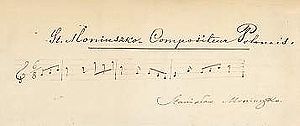- Stanisław Moniuszko
-
Stanisław Moniuszko (May 5, 1819 in Ubiel, near Minsk – June 4, 1872 in Warsaw, Congress Poland) was a Polish composer, conductor and teacher. His output includes many songs and operas, and his musical style is filled with patriotic folk themes of the peoples of the former Polish-Lithuanian Commonwealth (predominantly Polish and Belarusian[1]). He is generally referred to as the father of Polish national opera.
Contents
Life
Youth
Born in Ubiel (Minsk district in modern Belarus) to a Polish-Armenian [2] noble family of landowners[3] in 1819 on eastern fringe of Vilna Governorate of the Russian Empire, he displayed an early ability in music, and began private piano lessons with August Freyer[4] in 1827. In 1837, once his talent and interest justified it, Moniuszko began to formally study composition in Berlin with Karl Friedrich Rungenhagen, the director of the "Singakademie" Music Society,[5] who also instructed him in choral conducting. At the same time Moniuszko studied major works of the classical repertoire as well as the process involved in staging music.[3] While in Berlin, he had an unexpected early success when he set three songs to the words of the Polish national poet, Adam Mickiewicz.[6] Several of his songs composed during this period were published by Bote & Bock and were favorably received by the music critics.[3]
After three years in Berlin, he returned to Poland in 1840 to marry Aleksandra Müller. He obtained a post as an organist in Vilnius and also worked as a private piano tutor.[5] He often had to face financial difficulties, especially as his happy married life was blessed with an ever growing family. The Moniuszkos had ten children and together with the nurses and servants there came a time when 18 people sat down at their table every day.[7] He contributed greatly to music in the local area, staging performances of large choral works such as Mozart's requiem, and excerpts from Haydn's The Creation and Mendelssohn's St. Paul. There were also orchestral performances of works by Spontini, Mendelssohn and Beethoven.[4]
During that time he became acquainted with the novelist Jozef Ignacy Kraszewski and playwright-satirist Aleksander Fredro, who stimulated his interest in dramatic music. Around 1840, he began to compose intensively, writing his first operas and several other stage works, as well as sacred music and secular cantatas.[8] At around this time he began work on the collection of songs entitled Śpiewnik domowy (Songbook for Home Use), which came to have wide appeal to Polish public.[3] The first volume of this collection was published in 1843 and over the years the collection grew to 12 volumes containing 267 songs with piano accompaniment in total.
During his lifetime Moniuszko traveled numerous times to St. Petersburg where his concerts were very well received.[3] In St. Petersburg Mikhail Glinka and Alexander Dargomyzhsky showed appreciation of Moniuszko's talent; Moniuszko became a close friend of the latter, and dedicated his Bajka (Fairytale) to him.[9] He also knew Mily Balakirev, Modest Mussorgsky and Alexander Serov,[3] and his style was appreciated by Hans von Bülow.[8] Serov, the young Russian critic of the time, referred to Moniuszko's compositions as "brilliant works".[9] He was the mentor of César Cui. Most crucial to Moniuszko's career was, however, his visit to Warsaw in 1848. He met there Jozef Sikorski, the future editor of the most notable Polish music journal "Ruch Muzyczny" (Musical Movement), Oscar Kolberg a well-known folk song collector, and Włodzimierz Wolski, a poet and future librettist of Moniuszko's best known opera Halka.[7]
Maturity
In 1848 in Vilnius, he staged and conducted the premiere performance of the first, two act version of his opera Halka. It took ten years before the political climate cooled enough to be able to perform such a nationalist-themed opera again.[10] After the triumph of his new four-act version of Halka during the Warsaw premiere on 1 January 1858, he toured France, thanks to the help of the pianist Maria Kalergis, where he met Auber and Rossini. After a visit to Berlin, he met Smetana in Prague, who prepared the Prague premiere of Halka, and finally Moniuszko visited Weimar, where he met Liszt.[4] Named after its heroine, Halka, after being shown in two acts in 1848 in Vilnius, was premiered with great success in 1858 in Warsaw in its final four act form. On that evening the composer, shy and limping slightly, thanked the audience, bowing many times to incessant applause. It was soon later staged in Prague, Moscow and St. Petersburg,[4] where it met with great success.[10]
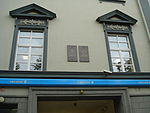 House in Vilnius where the composer lived between 1839–1858
House in Vilnius where the composer lived between 1839–1858
On 1 August 1858 he was appointed principal conductor of the Polish Opera in the Grand Theatre in Warsaw. He wasted no time in staging his opera Flis later that year, and during his 15 year tenure he conducted almost solely his own work.[5] In 1862 Moniuszko travelled to Paris again, hoping to have one of his operas staged there, but this didn't happen.[4] His early return from France, was due to a change in the political climate caused by the January Uprising, which was unfavourable to artistic activity. Moniuszko's composition was affected.[4] In 1864, Moniuszko started lecturing in harmony, counterpoint and composition in the Music Institute in Warsaw, where he also directed a choir. His disciples included, among others, Zygmunt Noskowski and Henryk Jarecki.[5] In 1865, a staging of his Straszny Dwór (The Haunted Manor) enjoyed an enthusiastic reception, and his new opera proved to be a success comparable to that of Halka.[5]
From the success of Halka to other major operatic compositions; Flis (The Raftsman), 1858, Hrabina (The Countess), 1860, Verbum Nobile, 1861, and most importantly Straszny Dwór (The Haunted Manor), 1865. The common trait shared by all these works are librettos that—while depicting Polish nobility and gentry, and sometimes characters of common origins—emphasized Polish customs and traditions, and at the time of national strife, sustained and fostered patriotic feelings.[5] Stanisław Moniuszko died on 4 June 1872 in Warsaw of a sudden heart attack and was buried in Powązki Cemetery. His burial ceremony becoming a national event and his music became widely acclaimed in Poland and generally accepted as a paragon of "Slavonic" music. There is a bust monument built in his honor in the Old Town of Vilnius in the middle of the square of his name.
Music
Moniuszko's opera and music as a whole is representetive of 19th century romanticism, given the extensive use by the composer of arias, recitatives and ensembles that feature strongly in his operas. An exception is Straszny Dwór (The Haunted Manor), where beautifully scored choral parts testify to Moniuszko's mastery of writing for many voices.[9] The source of Moniuszko's melodies and rhythmic patterns often lies in Polish musical folklore. One of the most visibly "Polish" aspects of his music is in the forms he uses, including dances popular among upper classes such as polonaise and mazurka, and folk tunes and dances such as kujawiak and krakowiak.[9] The most notable among his choral works are cantatas Sonety krymskie (Crimean Sonnets) and Widma (Phantoms), composed to the texts of Adam Mickiewicz, the leading poet of the Polish Romanticism. The melodic line of the former is particularly expressive and in parts of the composition takes on the form of variations.[9]
His series of twelve song books, Śpiewnik domowy (Songbook for Home Use), are notable for sheer number as well as quality. Though many of the songs are simple, predominately strophic, some take on a form of dialogues or ballads, and the majority testify to the composers originality and melodic inventiveness.[3] The source of Moniuszko's melodies and rhythmic patterns often lies in Polish and Belarusian musical folklore; the majority of the texts are those of some prominent Polish poets, of whom many traced their roots from what is now Belarus (where of Litvin origin): Mickiewicz, Pol, Kraszewski Syrokomla, Lenartowicz, Czeczot, Odyniec[9], Dunin-Martsinkyevich[11].
An English version of Straszny Dwór (The Haunted Manor) was created and premiered by the student operatic society at Bristol University in 1970; this version has been performed since, specifically in 2001 by Opera South. The company also presented the world premiere of a specially created new English version of Verbum Nobile in 2002.
Pocket Opera, in San Francisco, produced and presented Donald Pippin's English language version of Straszny Dwór (The Haunted Manor) in 2009, and of Halka (Helen) in 2010.
Legacy
During his life, Moniuszko was recognised as an important national composer,[12] but after his death, he became revered. From statues,[13] to the names of parks,[14] music competitions,[15] musicians,[16] and institutions[17] the name Stanisław Moniuszko constantly features in Polish society. He has also been featured on stamps,[18] bank notes[19] and other official documents in Poland. The 1,841 seat main auditorium of the Teatr Wielki, where the Polish National Opera is based, is also named after him.
Since the 1990s Stanisław Moniuszko is being recognized in Belarus as an important figure of Belarusian culture.[20] Moniuszko's operas are regularly performed at the Belarusian National Opera. There is a Museum of Stanisław Moniuszko [21]
Works
Stage works
Operettas
Work Form Composed Libretto Première Biuraliści (The Bureaucrats) operetta in one act c. 1835 I F Skarbeck unperformed Nocleg w Apeninach
(A Night in the Apennines)operetta in one act c. 1837-9 A Fredro Vilnius, 1839 Cudowna woda (The Miraculous Water) operetta in two acts, lost except overture 1840-1 Ideał, czyli Nowe Precjoza
(Perfection, or The New Preciosa)operetta in two acts c. 1841 O Milewski Vilnius, 1840 Karmaniol, czyli Francuzi lubią żartować
(Carmagnole, or The French Like Joking)operetta c. 1840-1 O Milewski (after Théaulon de
Torges and E Jaime)unperformed Nowy Don Kichot, czyl Sto szaleństw
(The New Don Quixote, or 100 Follies)operetta in three acts 1841 A Fredro (after M de Cervantes) Lwów 1849
Warsaw, 1923Żółta szlafmyca (The Yellow Nightcap) operetta c. 1841 F Zablocki lost Loteria (The Lottery) operetta in one act c. 1842-3 O Milewski Minsk, 1843 Cyganie (The Gypsies)
(revised as Jawnuta 1860)operetta c. 1852 F D Kniaźnin Vilnius, 20 May 1852 Beata operetta in one act c. 1870-1 Jan Chęciński Warsaw, 2 February 1872 Pobór rekrutów (Conscription) operetta 1842 Vintsent Dunin-Martsinkyevich lost Operas
Work Form Composed Libretto Première Halka (Helen) opera in two acts, later
enlarged to four actsc. 1847-8
& 1857Włodzimierz Wolski
(after K Wójcicki)Vilnius, 1 January 1848 Sielanka (Idyll) opera in two acts c. 1848? Vintsent Dunin-Martsinkyevich lost Betty comic opera in two acts c. 1852 F Schober (after Scribe and
Melesville)Vilnius, 20 May 1852 Flis (The Raftsman) opera in one act c. 1858 S Boguslawski Warsaw, 24 September 1858 Rokiczana (The King of Peasants) incomplete c. 1859 J Korzeniowski unperformed Hrabina (The Countess) opera in three acts c. 1869 Włodzimierz Wolski Warsaw, 7 February 1860 Jawnuta opera in two acts c. 1860 Warsaw 5 June 1860 Verbum nobile opera in one act c. 1860 Jan Chęciński Warsaw, 1 January 1861 Straszny Dwór (The Haunted Manor) opera in four acts c. 1861-4 Jan Chęciński (after K Wójcicki) Warsaw, 28 September 1865 Paria opera in three acts with
prologuec. 1859-69 Jan Chęciński (after a play by
Delavigne)Warsaw, 11 December 1869 Trea incomplete c. 1872 J Jasiński after a Femish legend unperformed Nowy dziedzic (The New Landlord) incomplete undated unperformed Sen wieszcza (The Seer's Dream) incomplete undated Władysław Syrokomla after J B Rosier
and A de Leuvenunperformed Walka muzyków
(The Musicians' Struggle)incomplete undated Vintsent Dunin-Martsinkyevich lost Ballet
- Monte Christo, after Alexandre Dumas (1866)
- Na kwaterunku (On the Bilet) (1868)
- Figle szatana (Satan's Tricks aka Devil's Frolics) (1870)
- Merry Wives of Windsor (c. 1849), ballet music composed for the opera of Otto Nicolai
Theatre
- Kasper Hauser (1843), melodrama by Anicet, Bourgeois and d'Ennery. First performance: Minsk, November 18, 1843
- Sabaudka (Savoyardess or the Mother's Blessing) melodrama in 5 acts by d'Ennery and Lemoine. First performance: Vilnius, May 6, 1845
- Hamlet. Shakespeare's tragedy. First performance: Warsaw, March 24, 1871
- Zbojcy (Die Rauber). Schiller's tragedy. First performance: Warsaw 1870 and 1871
- Hans Mathis, drama (1872). Finished by Adam Munchheimer
- Karpaccy gorale, drama by J. Korzeniowski
Vocal
Cantatas
Work Form Composed Text Première Milda cantata for solo voices,
mixed choir and orchestra1848 J.I. Kraszewski, after
WitoloraudaVilnius, 18 December 1848 Nijoła (Wundyny cantata for solo voices,
mixed choir and orchestraafter 1848 partly from Witolorauda Vilnius, 8 March 1852 Florian Szary (The Grey) ballad from unfinished opera
Rokiczana for baritone solo,
choir and orchestra1858-9 J. Korzeniowski Warsaw, 16 December 1860 Widma (The Ghosts) cantata for solo voices,
mixed choir and orchestrabefore 1859 Adam Mickiewicz, after
Dziady (The Forefathers)Warsaw, 1865 Sonety krymskie
(Crimean Sonnets)cantata (8 sonnets) for solo voices,
mixed choir and orchestra1867 Adam Mickiewicz Warsaw, 16 February 1868 Pani Twardowska ballad for solo voices, choir
and orchestra1869 Adam Mickiewicz Warsaw, December, 1869 Kurmine cantata unfinished Sacred
Work Form Composed Text Première Litanie ostrobramskie
(Litanies of Ostra Brama) no.1solo voices, mixed choir,
organ and orchestra1843 Latin Mass in A minor soprano, alto and organ 1848 A.E. Odyniec Litanie ostrobramskie
(Litanies of Ostra Brama) no.2solo voices, mixed choir,
organ and orchestra1849 Latin Funeral mass in D minor 4-part mixed choir and organ 1850 F. Felinski Litanie ostrobramskie
(Litanies of Ostra Brama) no.3solo voices, mixed choir,
organ and orchestra1854 Latin Litanie ostrobramskie
(Litanies of Ostra Brama) no.4solo voices, mixed choir,
organ and orchestra1855 Latin Mass in E minor 2 sopranos, alto and organ 1855 A.E. Odyniec (Polish),
Achilles Bonoldi (Latin)Mass in E-flat major solo voices, mixed choir, organ
and string quintet1865 Latin Mass in B-flat major
"Piotrowinska" (Piotrowin Mass)solo voices, mixed choir and
organ1872 Warsaw, 19 May 1872 Oto drzewo krzyza
(Ecce lignum crucis)motet for baritone solo, mixed
choir and organ1872 Latin or Polish translation
by M. KotarbinskiWarsaw, 29 March 1872 Modlitwa Panska "Ojcze nasz"
(The Lord's Prayer "Our Father")4-part mixed choir and
orchestra or organWarsaw, 17 June 1859 Psalm "Ne memineris" solo voices, mixed choir, organ
and string quintetLatin Psalm "Vide humilitatem meam" mixed choir, sting quintet and
organPolish Requiem aeternum 11 solo voices, mixed choir and
orchestraSongs
More than 300, listing the most popular:
- Chochlik (The Imp). Text by A.E. Odyniec
- Czaty (The Ambush), ballad. Text by A. Mickiewicz. Also in a version with orchestra
- Czarny krzyżyk (The Little Black Cross). Text by Bruno Bielawski.
- Dziad i baba (The Old Man and The Old Woman). Text by J.I. Kraszewski
- Dziadek i babka (Grandpa and Grandma). Text by P. Jankowski
- Entuzjasta (The Enthusiast). Text by J. Prusinowski
- Kozak (Cossack). Also known as Tam na gorze jawor stoi
- Kum i kuma (Chums). Text by J. Czeczot
- Łzy (Tears). Text by A.E. Odyniec
- Maciek. Text by T. Lenartowicz
- Magda karczmarka (Magda, the Innkeeper). Also known as W pustej karczmie Magda siedzi, ballad. Text by E. Sztyrmer
- Nad Nidą (On Nida River). Text by Włodzimierz Wolski
- Panicz i dziewczyna (The Young Master and The Girl). Also known as W gaiku zielonym. Text by A.E. Odyniec
- Pieśń wieczorna (The Song at Dusk). Also known as Po nocnej rosie. Text by W. Syrokomla
- Piosnka żołnierza (Soldier's Song). Also known as Już matka zasnęła. Text by J. Korzeniowski
- Polna różyczka (The Little, Field Rose). Text by J. Grajnert
- Powrót taty (Father's Return). Text by A. Mickiewicz
- Prząśniczka (The Spinner). Text by J. Czeczot. Also in a version with orchestra
- Rozmowa (Conversation). Also known as Kochanko moja, na co nam rozmowa. Text by A. Mickiewicz
- Rybka (The Fish). Text by A. Mickiewicz
- Świerszcz (The Cricket). Text by J.N. Kaminski
- Świtezianka (The Nymph of Lake Switez). Text by A. Mickiewicz
- Tren X (Lament No. X). Also known as Urszulo moja wdzieczna. Text by J. Kochanowski
- Trzech Budrysów (Three Budryses). Text by A. Mickiewicz. Also in a version with orchestra
- Trzy śpiewy: Niepewnosc, Pieszczotka, Sen (Three Chants: Uncertainty, Cuddlesome One, Dream). Text by A. Mickiewicz. German translation Blankensee
- Wilija (Christmas Eve). Text by A. Mickiewicz
- Znaszli ten kraj (Do You Know Such Land). Text by A. Mickiewicz, after J. W. Goethe
Instrumental
Chamber
- String quartet no.1 in D minor (1839)
- String quartet no.2 in F major (before 1840)
Organ
- Organ compositions on the themes of church songs, among others Vespers and Song of Ostra Brama. Published: Warsaw, 1862.
Piano
- Fraszki (Trifles). Two books. Published: Vilnius, 1843
- Nocturne in A-flat major. Published: Vilnius, 1846
- Mazurka in D major. Published: Vilnius, before 1846
- Six Polonaises. Published: Vilnius, 1846
- Polka in C major. Published: Warsaw, 1851
- Polka, "Daniel". Published: Warsaw, 1852
- Polka, "Gabirela". Published: Warsaw, 1855
- "Spring" Polka. Published: Warsaw, 1860
- Vilanelle in B flat major. Published: Warsaw, 1851
- Three Waltzes. Published: Warsaw, 1852
- "Wedding" Mazurka. Published: Warsaw, 1872
- Kolysanka (Cradle Song) in D major. Published: Warsaw, 19 March 1872
- Piano transcriptions of opera fragments and of works by other composers, among others Six Polonaises of Michal Oginski. Published: Warsaw, before 1858
- Original compositions and transcriptions for piano duet
Symphonic
- Bajka (Fairytale), fantastic overture (1848). Two versions. First performed: Vilnius, 1 May 1848
- Kain, overture (1856). First performance: St. Petersburg, March 1856
- War Overture. First performance: Vilnius, 19 March 1857
- Polonez koncertowy (concert polonaise) in A major, for large orchestra (1866)
- Polonez obywatelski, civic polonaise in F major (after 1863)
Recordings
Due to the current obscurity of Moniuszko outside Poland, this list more or less represents a complete discography.
Opera
- Halka: Andrzej Hiolski, Barbara Zagorzanka, Jerzy Ostapiuk, Ryszarda Racewicz, Wieslaw Ochman. Robert Satanowski cond., Polish National Opera Orchestra & Chorus. 2 CDs, DDD, CPO Records, Live (recorded 1987?), 18 January 1995
- Halka (highlights): Andrzej Hiolski, Edmund Kossowski, Barbara Nieman, Halina Slonicka, Bohdan Paprocki. Zdizislaw Gorzynski cond., Polish National Opera Orchestra & Chorus. CD, Polskie Nagrania Muza, 6 April 1994 (originally 1992)
- Halka: Harmonia Mundi/Chant du Monde?
- Halka: Tatiana Zacharczuk, Władimir Kuzmienko, Zbigniew Macias, Katarzyna Suska, Piotr Nowacki. Antoni Wicherek cond., Soloists, Choir, Ballet and Orchestra of The Great Theatre National Opera in Warsaw. DVD, 2h10m, ZPR Records, 1999
- Halka: Tatiana Borodina, Oleh Lykhach, Aleksandra Buczek, Mariusz Godlewski, Radosław Żukowski, Zbigniew Kryczka, Jacek Ryś, Rafał Majzner, Andrzej Kalinin, Rafał Majzner, Janusz Zawadzki. Ewa Michnik cond., Wroclaw Opera Orchestra, Chorus & Ballet. DVD, 2h16m, subtitles in Polish, English, German. DUX Recording Producers/Metronome, 19 March 2007. Cat. no DVD : DUX 9538, Barcode: 5902547095387
- Hrabina: Halina Slonicka, Agnieszka Kossakowska, Edmund Kossowski, Kazimierz Pustelak, Bogna Sokorska. Mieczysław Mierzejewski cond., Orchestra & Choir Teatru Wielkiego w Warszawie. CD, Polskie Nagrania Muza, 2004
- The Haunted Manor: Adam Kruszewski, Iwona Hossa, Jacek Parol, Anna Lubanska, Krzysztof Szmyt, Dariusz Stachura, Piotr Nowacki, Stefania Toczyska, Zbigniew Macias, Romuald Tesarowicz, Agnieszka Zwierko. Jacek Kasprzyk cond., Wielki Theatre Orchestra. 2 CDs, DDD, EMI Classics, Studio, 13 July 2004
- The Haunted Manor: Bozena Betley-Sieradzka, Wiera Baniewicz, Zdzislaw Nikodem, Wieslaw Ochman, Andrzej Hiolski, Leonard Mroz, Andrzej Saciuk, et al. Jan Krentz cond., Orchestra & Choir of the PRiTV, Krakow. 4 CDs, Polskie Nagrania Muza, 1 January 2003. SX 0253
- The Haunted Manor: Andrzej Hiolski, Bernard Ładysz, Bogdan Paprocki, Halina Słonicka, Zdzisław Nikodem. Witold Rowicki cond., Orchestra & Choir Teatru Wielkiego w Warszawie. Polskie Nagrania Muza, 1992. PNCD093
- The Haunted Manor: Bogdan Paprocki, Edmund Kossowski, Antonina Kawecka, Marian Woźniczko, Barbara Kostrzewska, Felicja Kurowiak, Radzisław Peter, Zygmunt Mariański, Henryk Łukaszek, et al. Walerian Bierdajew cond., Poznań Opera. Early 1950s
- Verbum Nobile: Andrzej Kizewetter, Krystyna Pakulska, Marian Kondella, Jan Czekay, Edward Kmiciewicz. Robert Satanowski, cond., Orchestra & Choir Państwowej Opery. CD, AAD, 1h5m, Polskie Nagrania Muza, 1993. PNCD 247
Vocal
- Canons: Krzysztof Szmyt, Pawel Skaluba, Piotr Kusiewicz, Ryszard Minkiewicz. CD, DDD, DUX Recording Producers, 27 March 2001
- Litanies of Ostra Brama: Czeslaw Galka, Anna Lubanska, Iwona Hossa, Adam Zdunikowski. Henryk Wojnarowski cond., Warsaw Philharmonic Chamber Orchestra. CD, CD Accord, 5 September 2006
- Religious Songs: Andrzej Hiolski, Jaroslaw Malanowicz, Joanna Kozlowska, Piotr Kusiewicz. CD, DDD, CD Accord, 26 June 2001
- Religious Works: Marian Sawa, Witold Pilewski, Anna Malewicz, Krystyna Szoslek-Radkowa, Krystyna Szostek-Radkowa, et al. Edmund Kajdasz cond., Warsaw Chamber Orchestra. CD, ADD, Olympia, 4 October 1993
- Śpiewnik domowy I: Bożena Betley, Alina Bolechowska, Maria Fołtyn, Jadwiga Romańska, Hanna Rumowska-Machnikowska, Halina Szymulska. CD, Polskie Nagrania Muza, 1996. PNCD348
- Śpiewnik domowy II: Andrzej Hiolski, Bernard Ładysz, Wiesław Ochman, Maciej Witkiewicz. CD, Polskie Nagrania Muza, 1996. PNCD349
Instrumental
- Opera Overtures: Grzegorz Fitelberg; Jan Krenz; Witold Rowicki cond., Polish Radio Orchestra & Chorus Katowice; Warsaw National Philharmonic Orchestra. CD, ADD, Olympia, 4 October 1993
- Overtures: Robert Satanowski cond., Filharmonia Pomorska Bydgoszcz. CD, DDD, CPO Records, 25 January 1995
- Overtures & Dances: Roland Bader cond., Krakow Philharmonic Orchestra. CD, DDD, Koch Schwann, 21 January 1997
- String Quartets (w/ Ignacy Feliks Dobrzyński): Camerata Quartet. CD, DDD, DUX Recording Producers, 29 May 2007
- Новае неба Станіслава Манюшкі: Classic Avantgarde ensemble (Belarus). CD, 2008.
- Mazur from Act IV Straszny Dwór with Warsaw Philharmonic Orchestra under the direction of Witold Rowicki, 1967, Orchestral CDs, CD12/2011
References
- ^ Станіслаў Манюшка — паляк, літвін…
- ^ Jan T. Z. (24 IV 2005 r)"Вспоминая геноцид Армян. Польские армяне"(на польском)
- ^ a b c d e f g University of Southern California: Polish Music Center |Stanisław Moniuszko
- ^ a b c d e f Culture.pl |Stanisław Moniuszko
- ^ a b c d e f Polish Music Information Centre |Stanisław Moniuszko
- ^ EditionSilvertrust.com |Stanisław Moniuszko
- ^ a b Archive.org |Stanisław Moniuszko
- ^ a b Karadar.com |Stanisław Moniuszko
- ^ a b c d e f Prominent Poles |Stanisław Moniuszko
- ^ a b Polish Art Center |Stanisław Moniuszko and His Operas
- ^ «Нацыянальнае, краёвае, мясцовае…»
- ^ Teatr Wielki |"Teatralny Square and its environs"
- ^ See Stanisław Moniuszko in Wikimedia Commons
- ^ Stanisław Moniuszko Park in Poznań
- ^ Stanisław Moniuszko Vocal Competition
- ^ Stanisław Moniuszko Mixed Chorus
- ^ Stanisław Moniuszko Academy of Music in Gdansk
- ^ Stanisław Moniuszko stamp (also hosted on Wikimedia Commons at Stanisław Moniuszko)
- ^ Stanisław Moniuszko bank note (also hosted on Wikimedia Commons at Stanisław Moniuszko)
- ^ Праправнучка Станислава Монюшко: “В Минске должен появиться памятник композитору”
- ^ Stanisław Moniuszko Museum, Belarus
External links
- RecMusic.org | Song texts
- NYTimes.com | Review of the "Haunted Manor"
- String Quartet Nos.1 & 2 sound-bites and discussion of works
- Free scores by Stanisław Moniuszko at the International Music Score Library Project
- Free scores by Stanisław Moniuszko in the Werner Icking Music Archive (WIMA)
- Free scores by Stanisław Moniuszko in the Choral Public Domain Library (ChoralWiki)
Categories:- Polish composers
- Romantic composers
- Opera composers
- Polish conductors (music)
- Polish classical organists
- 1819 births
- 1872 deaths
- Polish music educators
- Polish people of Armenian descent
Wikimedia Foundation. 2010.

